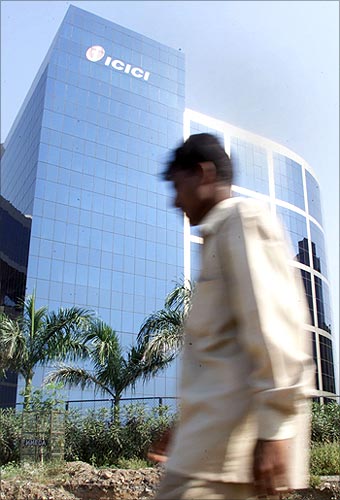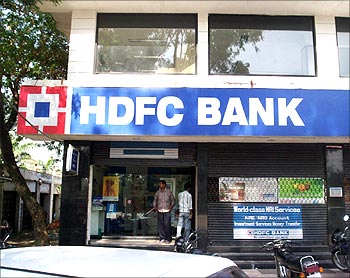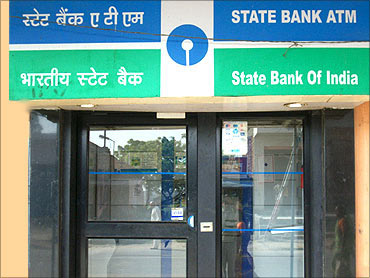Neha Pandey and Dipta Joshi in Mumbai
ICICI Bank's fixed-cum-floating rate loan will charge a spread of 100 basis points when shifting to the floating rate regime.
Home loan rates, which have been rising consistently, and sometimes even on a monthly basis, have had borrowers on tenterhooks.
Last week, the country's largest private sector bank, ICICI Bank, launched a product with a fixed rate for the first and second years before becoming floating from the third year onwards.
This product is expected to reduce fear among borrowers, as they will not see their equated monthly instalments rising every month.
Rates comparable to other lenders
The fixed rates, though, are not very different from those of other banks.
...
Confused over teaser, floating, fixed loans? Don't be
Image: HDFC is charging 10.75 per cent for loans below Rs 30 lakh.Harsh Roongta, CEO, Apnapaisa.com, said: "In a teaser rate loan, the consumer pays interest rates that are lower than what he would otherwise pay on a normal loan for a similar purpose and duration. ICICI Bank's new scheme does not offer any concessional rates at all, as compared to a regular floating rate loan."
What's the spread?
Designed along the lines of teaser loans, introduced by SBI in February 2009, the product works on the formula that the buyer will pay a pre-decided spread when shifting to the floating regime after two years.
...
Confused over teaser, floating, fixed loans? Don't be
Image: SBI introduced teaser loans in 2009.In case of ICICI Bank, for loans up to Rs. 25 lakh, the spread will be 50 and 75 basis points more than the base rate for loans that are fixed for one and two years, respectively.
Under the one-year fixed rate loan, customers will pay 10.50 per cent for loan amounts up to Rs. 25 lakh, 11 per cent for loans of Rs. 25 lakh-75 lakh and 11.50 per cent for amounts higher than Rs. 75 lakh.
...
Confused over teaser, floating, fixed loans? Don't be
Image: Spread is higher when one is shifting to floating.In other words, the spread will double when the loan becomes floating. That is, the base rate of ICICI Bank is 10 per cent now and it is charging 10.50 per cent for this product (the bank's normal floating is at 11 per cent) - base rate plus 50 basis points more for loans up to Rs. 25 lakh.
So, since the rate is lower than the normal floating rate, the spread is higher when one is shifting to floating.
...
Confused over teaser, floating, fixed loans? Don't be
Image: Monthly installments could go up if final rates rise.If one shifts from fixed to floating after one year, the rate of interest will be base rate plus 100 basis points.
Assuming the base rate stays the same, the customer will be paying 11 per cent.
So, if you have opted for the one-year fixed rate scheme, you could be paying a first-year equated monthly installment of Rs. 24,959 for a Rs. 25 lakh loan at 10.5 per cent for a 20-year tenure.
This could go up to Rs. 25,780, if the final interest rates go up to 11 per cent after one year.
...
Confused over teaser, floating, fixed loans? Don't be
Image: Financial experts are sceptical about the new product.The EMI would be Rs. 25,381. If the base rate rises by 50 basis points after one year, the new EMI for SBI and HDFC loans would be Rs. 26,207.
For ICICI Bank, the new EMI would be Rs. 26,610 - the difference Rs. 403 per month or Rs. 4,836 annually.
No wonder, financial experts are sceptical.
K V S Manian, group head - retail liabilities and branch banking, Kotak Mahindra Bank, said: "This product is designed for those who believe interest rates may go up further. But, I don't think timing the rise in interest rates, is a wise thing to do."
...
Confused over teaser, floating, fixed loans? Don't be
Image: Interest rate cycle could be close to peaking.Many also feel the interest rate cycle could be close to peaking. In that case, getting locked into a rate for one or two years may not be the smartest thing to do, especially when there is a premium to be paid when shifting.
According to certified financial planner Arnav Pandya, if rates ease, then opting for ICICI's two-year fixed rate scheme will not be such a good idea.
"From here, we might see a couple of rate rises and if one gets locked in, he or she will lose the benefits once the rates start coming down," he adds.









article